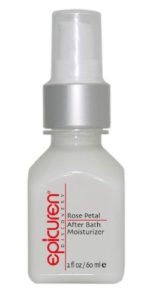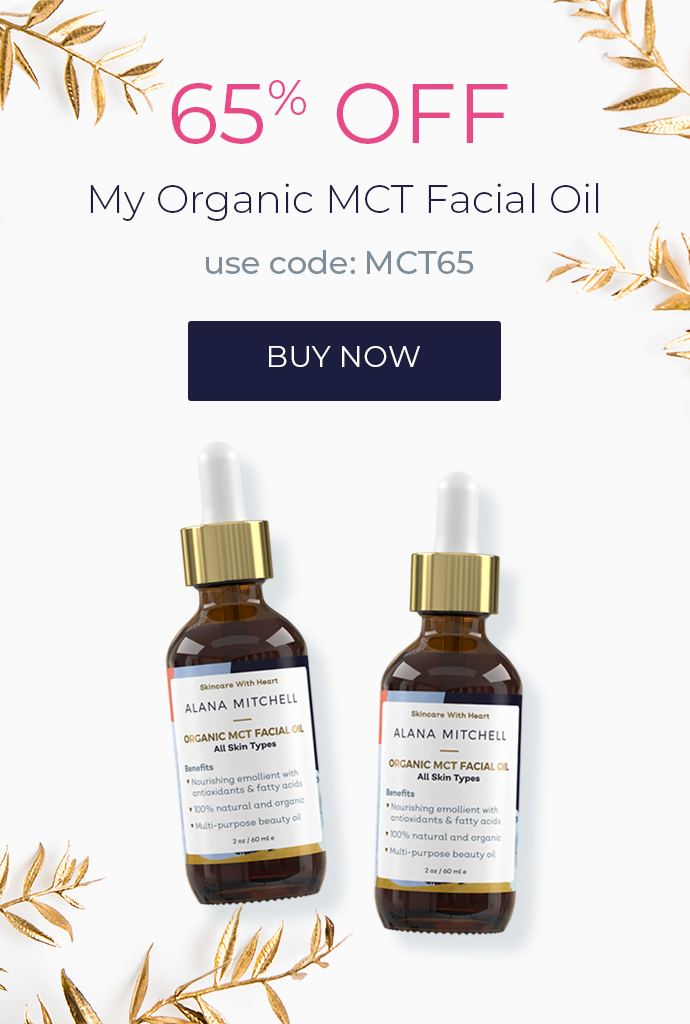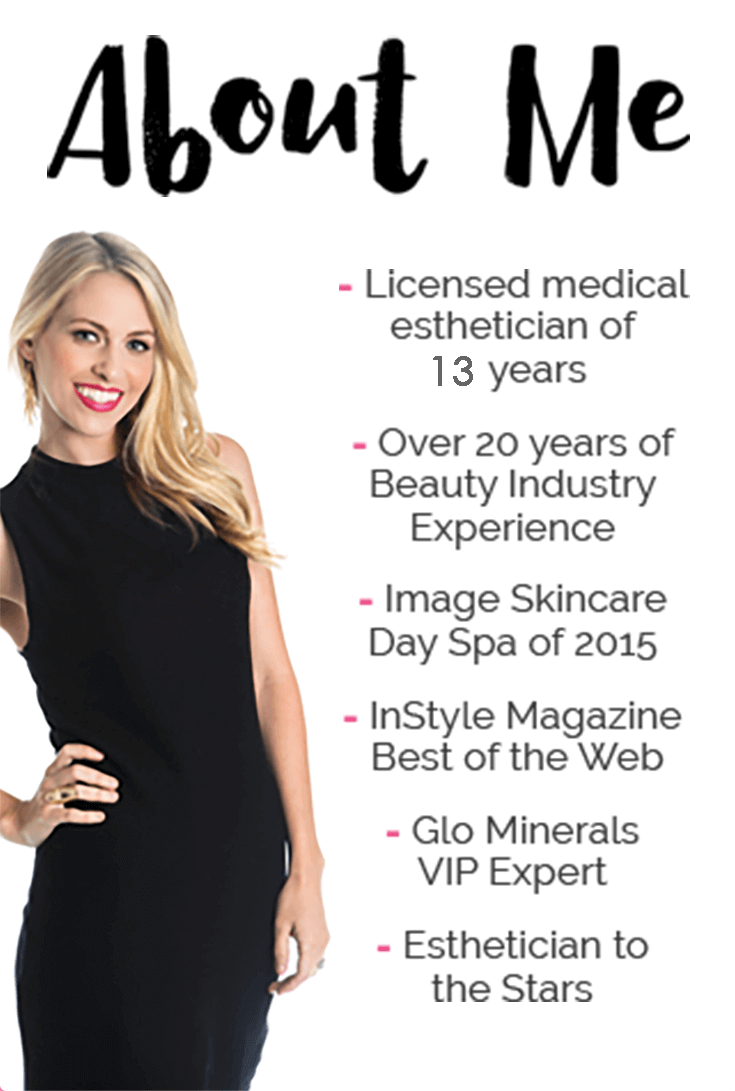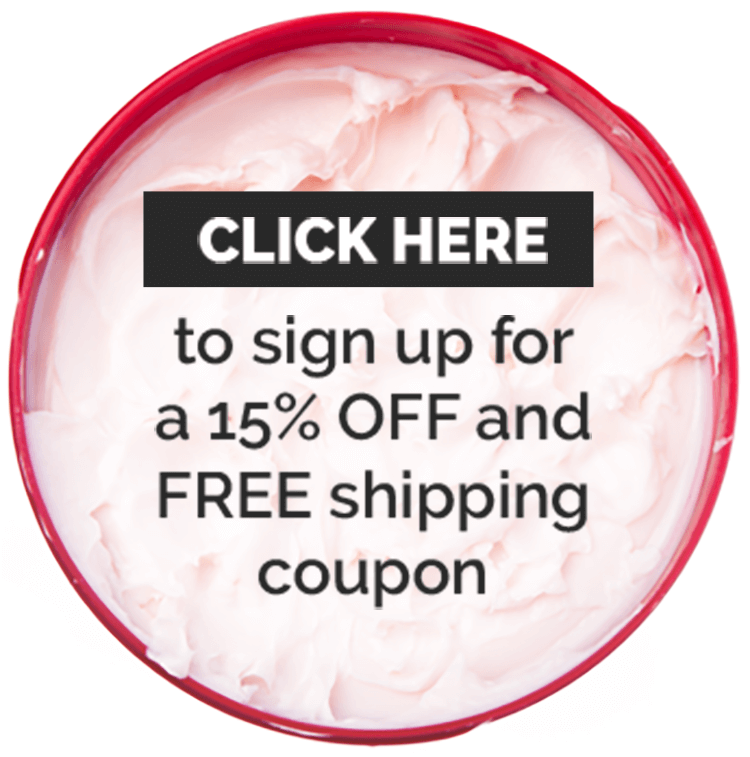What Should You Be Using In Your Skin Care Routine?
Take my quiz and get personalized recommendations from a
licensed esthetician!
Flower Power! How Floral Ingredients Are Changing the Skincare Game
There are few things more instantly uplifting and day-brightening than a fresh bouquet of flowers!
They’re fragrant, vibrant, and aside from being aesthetically pleasing to look at, they provide some of the most essential healing ingredients on earth.
Sure, it’s 2017 and we have a scientific component for just about everything when it comes to our health and overall wellness.
But did you know that even in today’s advanced world, sometimes the most effective ingredients are natural ingredients?
They're more in-demand than ever!
Yep, we’re talking flower power.

Flowers have been used in skincare for ages - but they're still continuing to make an impact in the industry.
Many floral ingredients offer a natural substitute for more traditional or conventional components in skincare and beauty products.
The natural preservatives found in many flowers provide restorative properties.
Today, I'm going to take a look at some of the most popular flowers used in skincare products, talk about their benefits, and examine the "natural ingredients" trend.
Let's get started!

A Brief History Of Floral Healing
When you think of flowers and skincare, roses probably spring to mind first.
And they are for sure a prominent power in beauty regimens - they have been for centuries.
But let’s dig a little deeper and uncover all the wonderful ways flora and fauna serve a purpose in health, beauty, and - of course - in skincare.
First, we’ll stop and smell the roses on our quick history lesson.
Rose petals, rose oil, and rose water date back to the ancient Greeks and Romans.
They used it as perfume, in makeup, and to freshen up linens.
They believed roses helped to plump, brighten, and even out the skin.
Rose also contains anti-fungal, antibacterial, and anti-inflammatory properties that make it effective in preventing acne as well as in treating skin irritations like eczema, dermatitis, rosacea and fungal infections.
Lavender, hibiscus, and calendula have also been used in similar ways for many, many years.
Mostly everyone is familiar with the fresh, relaxing smell of lavender and the succulent, summery scent of hibiscus.
Lavender in particular also actually helps to increase cell renewal, so it can be used for scars, wrinkles, burns, and stretch marks.
Calendula is less known for its smell than its healing powers - it’s often used to reduce inflammation.
During the Civil War, in fact, calendula was used as an active healing agent for that very reason.
And chamomile?
It’s not just for tea!
While it’s known for its soothing effect - and helping us all relax enough to sleep better - it’s been used to help reduce puffiness around the eyes for centuries.
Flowers: Friends With Benefits Aplenty
Through flowers, almost all things are possible!
When it comes to skincare, anyway.
If you want to know more about the healing and beauteous benefits made possible by florals, I’ve created a list of the top floral ingredients you will find in beauty and skincare products.
Here is a comprehensive list from my own floral dictionary.
Now you can brush up on this information to become a floral knowledge buff!
Allantoin is derived from the comfrey root.
Benefits:
- Non-allergenic
- Good for sensitive and acne-prone skin
- Soothing and calming
- Protects the skin
Purpose:
It helps protect the skin against external forces (i.e. cold/dry weather, wind), making it an excellent temporary anti-irritant.
Allantoin helps to heal damaged skin and is even believed to stimulate new tissue growth.
Skin is softened and soothed while cell regeneration is stimulated.
Chamomile extract is derived from chamomile flowers by steam distillation.
Benefits:
- Non-comedogenic
- Anti-inflammatory
- Anti-bacterial
- Anti-itching
- Soothing
- Antiseptic
- Refreshing
- Hypoallergenic
Purpose:
Chamomile is excellent for conditions such as dry skin, eczema, and psoriasis because of its ability to neutralize skin irritants and its anti-itch and anti-inflammatory properties.
Flavinoids in chamomile soothe the skin and improve the speed at which damaged skin heals.
It's also used as a conditioning agent as it enhances the appearance of dry, flaky skin and restores suppleness.

Dandelion is a common flower that is often seen as a weed.
Also known as lion’s tooth, priest’s crown, or Irish daisy, you’ve probably seen these little yellow flowers that turn into puffballs (you may have even made a wish while blowing on one).
Its leaves, flowers, roots, and the sap from its stems are all used in various forms for their health properties.
Benefits:
- Anti-aging properties
- Stimulates collagen production
- Calms inflammation
- Protects against free radical damage
- Detoxifies skin
Purpose:
Dandelion is often included in skincare for its skin refining, soothing, and anti-aging benefits.
It includes vitamins A, C, and E, which protect skin against free radical damage and stimulate collagen production.
It also contains magnesium and zinc which help detoxify skin, and anti-inflammatory properties to help calm irritation, making it great for soothing acne-prone skin.
Flaxseed oil is derived from the seed of the flax plant (also known as linseed).
The seeds are small and brown, tan, or golden in color.
Benefits:
- Soothing
- Safe for sensitive skin
- Reduces signs of aging
- Contributes to healthy skin
- Treats psoriasis and eczema
Purpose:
Flaxseeds are the best sources of plant-based omega-3 fatty acids.
These fatty acids help improve skin’s elasticity and texture.
They smooth the skin and reduce the appearance of wrinkles by helping to repair skin cells, which also benefit the skin’s overall health.
Flaxseed oil is ideal for treating skin conditions, such as psoriasis and eczema, by reducing redness, itching, inflammation, and irritation.
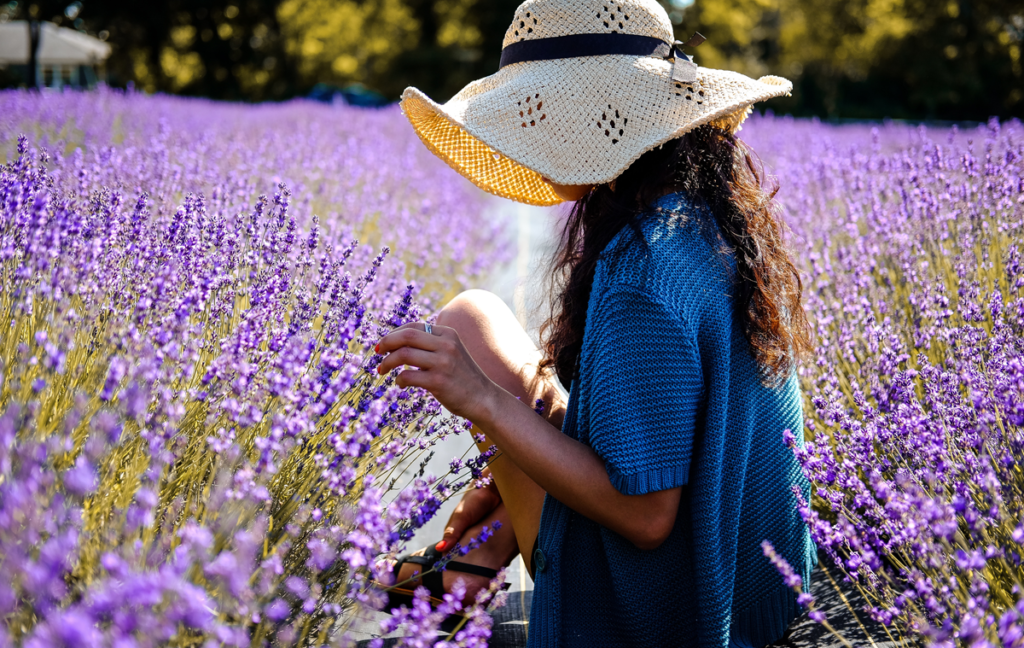
Derived from the flowers and the stalks, lavender has a pleasant fragrance and its color ranges from pale yellow to yellow-green.
Benefits:
- Relaxing and soothing fragrance
- Anti-inflammatory, antiseptic, and anti-bacterial
- Regulates skin functions
- Heals wounds and common skin conditions
- Generally considered non-toxic and non-irritating
Purpose:
Well-known for its fragrance and therapeutic properties, lavender has many benefits for the skin as well.
It relieves stress, is relaxing and soothing, and calms the skin.
Lavender is said to normalize any skin type, and it’s particularly good for oily skin.
It also effectively treats acne, eczema, burns, and psoriasis, and cleans small wounds after washing.
This is because it stimulates cellular growth and regeneration.
Also known as radish root ferment filtrate, leuconostoc is derived from radishes fermented with bacteria to act as a natural preservative.
It ranges in color from clear to a light amber.
Benefits:
- Water-soluble
- Anti-fungal
- Antimicrobial
- Compatible with a wide range of skincare ingredients
- Minimal irritation potential
Purpose:
An alternative to potentially harmful preservatives, leuconostoc is a natural antimicrobial preservative used in skincare and cosmetics.
It can also be useful when used topically in products for skin or scalp conditions as it moisturizes and conditions.

There are four primary varieties used in cosmetics: edulis, incarnata, laurifolia, and quadrangularis.
Its benefits depend on the variety and the portion of the plant used (flower, fruit, or seed).
Passion flower is also called maracuja and purple granadilla.
Benefits:
- Anti-spasmodic, calming
- Good for sensitive and acne-prone skin
- Soothing and calming
- Protects the skin
- Anti-aging benefits
Purpose:
Passion flower extract is full of nutrients that are good for the skin, including vitamins A and C, and essential fatty acids.
It’s known for protecting the skin against environmental stressors.
Passion flower extract is great for keeping the skin looking firm and youthful.
It reduces the appearance of fine lines and wrinkles and keeps the skin smooth and plump.
Also, it hydrates and moisturizes the skin without clogging pores.

Wild geranium is known for its vibrant pink, blue, and purple shades.
It contains skin-benefiting oils that are extracted from its stems and leaves.
Benefits:
- Astringent, toning properties
- Stimulates cell turnover
- Calms inflammation
- Reduces appearance of wrinkles
- Antibacterial
Purpose:
Wild geranium, a relatively common flower, delivers some wonderful skin benefits.
The leaves, stems, and roots are high in tannins and offer amazing natural astringent properties.
Astringents tone and firm the skin, and diminish the appearance of wrinkles.
It also helps reduce inflammation.
Wild geranium also includes cytophylactic properties.
In non-science terms, it means it encourages new cell growth to promote skin healing.
Plus, it’s a natural antibacterial for healthy skin all around!
Witch hazel is an extract made from the leaves and bark of the witch hazel shrub.
It's made through the process of distillation (the process of purifying a liquid by successive evaporation and condensation), or decoction (extraction by means of boiling).
Benefits:
- Anti-inflammatory
- Astringent
- Great for oily skin
- Soothing
- Fades scars
Purpose:
Witch hazel widely used in skincare as an astringent and toner.
It also touts anti-inflammatory and soothing properties, which make it great for treating acne, sunburns, and nourishing the skin.

Flowers: Moment Or Movement?
Consumers want "natural” beauty ingredients.
What it boils down to is that people are serious about what goes on their skin!
They don’t always want to rely on harsher ingredients that may irritate allergies or sensitivities.
I love that natural ingredients are kind of having a “moment” right now.
Especially floral ingredients, which are in abundance in mainstream beauty stores more than ever before.
You don’t have to go to a health food store to find lavender, dandelion, and other botanical extracts anymore.
The natural and organic beauty market is booming - there’s no doubt about it.
It’s expected to reach $13.2 billion in sales by next year, according to recent research.
It looks like the demand for safe, natural (and tested) beauty products will only continue to grow.
This leads me to believe floral ingredients are definitely part of - and perhaps driving - the movement toward natural beauty products and regimens.
The power of the flower is that flower extracts can help beautify our skin and hair - from shampoos and conditioners to serums, moisturizers, astringents, oils, lotions, and soaps.
You name it, and it seems like there isn’t a product out there that doesn’t contain floral agents in one way or another.
In my years as an esthetician, I’ve found that many people believe that “natural” is synonymous with simple.
Or that natural ingredients mean they’re untested - yikes!
When in fact, as we’ve learned above, floral extracts can be some of the most powerful ingredients in the world.
Synthetic ingredients are often less expensive, and sometimes more easily available.
And we can’t get rid of chemical ingredients altogether because we rely on and benefit from them just as much in certain products.
But synthetic ingredients have often been created and manufactured to mimic natural ones, like florals.

Flowers Are The Best Of Old And New In Beauty
Floral extracts and flowers, in general, have played a prominent role in beauty in cultures all over the world throughout history.
They have always been and will always be an incredibly sought-after natural remedy for many concerns.
Ranging from anxiety, headaches, and digestive troubles to all manners of skincare needs, floral ingredients are popular and effective because they’re gentle and natural.
But they can also pack a punch (in a good way)!
Many floral extracts and oils contain antioxidants and vitamins that also help moisturize and cleanse skin.
Antioxidants help fight early signs of aging (think of them as free radical warriors) and damage.
The quickest and easiest way to benefit from floral ingredients is to search for products that use floral oils and extracts as a prominent ingredient.
The best part about looking for beauty products that incorporate floral ingredients?
Many of them already do.
Check the ingredients list on your favorite cleansers, toners, and moisturizers to see if you’re already benefiting from them yourself!
As always, I recommend testing for allergens and irritants on a small patch of skin - like the back of your wrist - prior to fully using any new product.
And always consult a dermatologist or licensed esthetician if you have any questions, concerns, or just need some guidance on finding the perfect “floral fit” for your own beauty regimen.
Pro tip: Sometimes, I like to put a few drops of floral essential oils into a dab of my moisturizer or night cream.
Product Recommendations
These are some of my favorite products that deliver fantastic results and are made with - you guessed it - flowers.
Alana Mitchell Foaming Pumpkin Cleanser
Alana Mitchell Anti-Aging Peptide Eye Cream
Alana Mitchell Moisture Boost Serum
Epicuren Rose Petal After Bath Moisturizer
Image Skincare Clear Cell Salicylic Clarifying Tonic
Eminence Organics Lavender Age Corrective Night Eye Cream
Final Thoughts
Hopefully, now you see what the floral frenzy is all about!
Flowers are pretty by themselves - but they can help you look and feel pretty, too.
They've always been an effective and useful skincare ingredient.
Now, they're being used more and more often in products, and with good reason!
Beauties, are you a fan of floral ingredients in skincare? Do you have any favorites or go-to's? Share with us in the comments!
Top Brands
New Brands

Recent Posts

Are You Taking the Right Steps to Care for Your Skin?
Take the Quiz
Skincare Secrets!
10-step guide for healthy, beautiful skin after kids.
100% privacy. I will never spam you!




